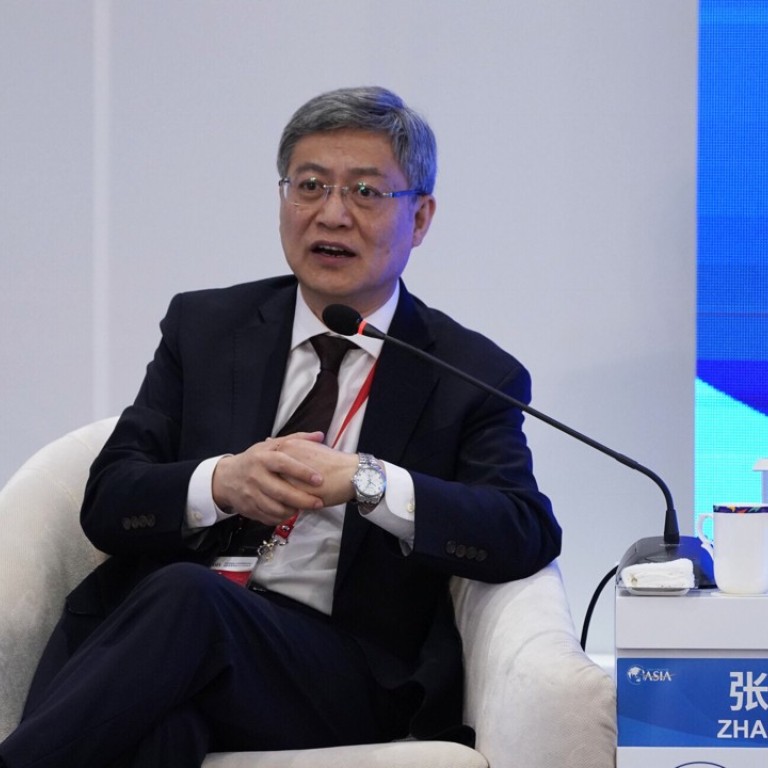
It’s a trade war, not a finance war, Chinese economists argue at ‘Asian Davos’
Beijing unlikely to up the ante and resort to broader retaliation in its trade spat with the United States, observers say
Economic insiders at the “Asian Davos” have urged leaders of the world’s two biggest economies to keep a cool head and resist opening up monetary and financial fronts in a trade war.
Rising trade tensions between China and the United States have prompted speculation about how Beijing would respond to Washington’s threatened tariffs on a combined US$150 billion in Chinese goods. Possible retaliation ranges from a sell-off of US Treasuries to a devaluation of the Chinese currency.
But Li Yang, a senior economic adviser to the Chinese leadership and the head of the National Institute for Finance and Development, an official think tank, told the Boao Forum for Asia on Monday that China was unlikely to use financial means to tackle its trade disputes partly because Beijing had more tolerance for trade losses.
Li said China was in good shape to withstand hits from US President Donald Trump’s trade actions because net exports played only a marginal role in China’s overall economy compared to domestic consumption and investment.
A trade war “would not carry a significant blow” to China, he said.
“We would definitely have losses, but the negative impact on our economy would not be that big,” Li, a former member of China’s monetary policy committee, said.
As such, there was no reason for Beijing to up the ante and complicate the situation with exchange rate warfare, he said.
And while Chinese state media outlets have ramped up their rhetoric on the dispute, neither country has yet imposed punitive tariffs. Trump also appeared to soften his tone on Sunday, tweeting that China would “take down” its trade barriers and “a deal will be made” on intellectual property.
Sheng Songcheng, a former central bank statistics chief and now a counsellor at the People’s Bank of China, agreed that there was more to lose than gain from devaluing the yuan.
Financial News, the central bank’s official newspaper, quoted Sheng as saying that devaluation could speed up capital outflows and was not needed to spur exports.
Tu Guangshao, president of China Investment Corp, said the sovereign wealth fund still wanted to expand its direct investment in the US.
“Of course I want to increase China Investment Corporation’s direct investment in the US and I have stated my attitude clearly,” he said in Boao.
Adding his voice to the chorus against broader retaliation, Zhang Yuyan, director of the Institute of World Economics and Politics under the Chinese Academy of Social Sciences, said China must “draw a line” between financial and trade issues.
“Selling forex reserves is a financial issue,” Zhang said.
“The market is worried that China might have a massive sell-off of US Treasuries, and this could push up US interest rates and spill over into the rest of the world. But I think that’s a small likelihood and should be separated from the trade issue.”
Zhang said trade-linked uncertainty over the yuan’s future would persist until the issue was settled.
“The decision makers, government officials and scholars from the two countries all know that if a trade war does start between the two, there is no winner – only losers,” Zhang said. “I’m an optimist and believe the two countries will manage to find a solution through negotiation [before the US tariff deadline].”
An escalation in trade tensions between China and the US could also be risky for other economies in Asia because many are links in supply chains for goods destined for the US, according Fan Gang, president of the Shenzhen-based China Development Institute.
“China’s exported goods contain lots of imports from other Asian countries ... Those parts are assembled in China. For example, an iPhone is sold for US$1,000, but China only adds US$50-100 of the value,” said Fan, who sits on the central bank’s monetary policy committee. “Disputes between China and the US could disrupt the whole chain of trade.”
Additional reporting by Grace Tsoi

